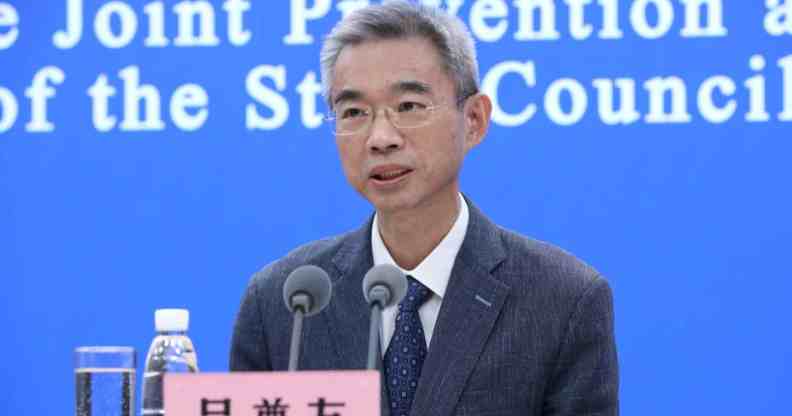Monkeypox: Chinese official sparks backlash after telling people not to touch foreigners

Wu Zunyou, chief epidemiologist at the Chinese Center for Disease Control and Prevention, attends a press conference in Beijing. (VCG/VCG via Getty Images)
A Chinese epidemiologist has been criticised for warning locals against “skin-to-skin contact with foreigners” after the country recorded its first case of monkeypox.
According to the BBC, chief epidemiologist at the Chinese Center for Disease Control and Prevention (CDC) Wu Zunyou made the comments on Chinese social media platform Weibo on Saturday (17 September).
“In order to prevent possible monkeypox infection and as part of our healthy lifestyle, it is recommended that… you do not have direct skin-to-skin contact with foreigners,” he wrote.
Wu added that locals should avoid touching strangers or people who had returned from overseas in the past three weeks.
“It is necessary and very important to strengthen the surveillance and prevention of monkeypox epidemic at the social level,” he added.
While some agreed with Wu’s advice, his post attracted criticism on Weibo, with one user branding the scientist “racist”.
Monkeypox is spread through close skin-to-skin contact and can affect anybody, though in the current outbreak the majority of cases have been detected among queer men, as the virus is spreading through sexual networks.
The city of Chongqing recorded its first monkeypox infection on Friday (16 September), reportedly from a person who had arrived from abroad.
There have been 61,282 global cases of monkeypox during the 2022 current outbreak, according to the United States CDC’s latest data as of Monday (19 September).
The United States, which declared the virus a public health emergency in August, reported its first confirmed death from the virus on Thursday (15 September) in Los Angeles, California.
It also reported at the beginning of September that at least 31 cases of monkeypox had been confirmed in children in the US.
In the UK, where cases are falling, a health expert has said the monkeypox outbreak requires “urgent action” from the government.
Danny Beales, head of policy and campaigns at the National AIDS Trust, said: “We need urgent action on monkeypox from the new health secretary [Thérèse Coffey].
“The outbreak has so far not had the resources and attention it needs. We have the tools to vaccinate, test and treat people with monkeypox, so people are suffering unnecessarily.”
He added that sexual health services “have received zero additional funding” since the monkeypox outbreak, and are “having to cancel appointments and restrict [HIV] PrEP [pre-exposure prophylaxis]”.
“They need additional funding and support,” he said.
“If action isn’t taken urgently, we will see more people diagnosed with HIV and monkeypox unnecessarily.”

